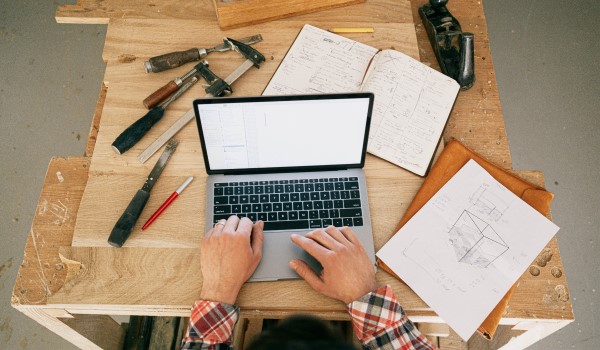What is a self-build mortgage?
If you’re planning to build your own home, a ‘normal’ residential mortgage just won’t fit the bill. You’ll be in the market for a self-build mortgage, which is a specialist type of mortgage designed to help you fund these types of projects. A self-build mortgage, as the name suggests, is a loan you take out to fund a property you’re building yourself.
Different types of self-build mortgage
There are two different types of self-build mortgage:
- Valuation based mortgage with stage-based payments: This type of mortgage values the property at each stage to make sure the value covers the amount that you're borrowing. The aim is, at the end of the build, the value of the finished property is enough to cover the amount borrowed. A potential issue is if house values drop during the build you may not get the next payment amount released. Or if it's not valued during a stage review as worth enough you may not get your next release. This type of self-build mortgage could be more suited to people who have a healthy cash reserve to help fund the build of their project.
- Cost-based mortgage with stage payments: As the name suggests, this type of self-build mortgage also offers stage-based payments but these are based on build costs and can be paid before or after each stage of works. The agreement is made before each stage, or you receive ‘advance’ stage payments which means you’ll get the cash to fund the stages of the build to pay for labour and materials. This option is helpful for cashflow if you don’t have the funds available. If costs over shoot then you could come into difficulty but they're less likely to change significantly unlike house values - which can go up as well as down
How do self-build mortgages work?
Financing a self-build home yourself can be tough unless you have a bottomless pit of cash, so using a self-build mortgage could be your answer. But how do they work? With a self-build mortgage you’ll receive the money in stages as parts of the property build are finished, rather than as one lump sum so you’ll need to have cash reserves to fund the start of the build.
Self-build mortgages are seen by lenders as one of the highest risk forms of lending because they're essentially lending you money on an unfinished property which will be much harder to sell on compared to a property that’s already built if they needed to get their money back.
Getting the money to you in dribs and drabs reduces the lender's risk and ensures that the money is spent as planned, so you don't run out when you don't have a roof!
If you own the land already you won’t need a mortgage for this but if you need a mortgage for the land as well as the build, then you’ll usually need a 20% deposit just for the land and the lender will provide the other 80% as a loan. Then, you’ll need your stage payments as agreed for your actual build.
What does your lender need to see for a self-build mortgage application?
As with a residential mortgage your potential lender will need to see a few things to agree to lend you the money that you need for your dream home.
- Details of your income and outgoings
As with any mortgage application any debts that you have will be considered by the lender so try to pay off any outstanding credit or store cards and it’s not a good idea to take on bigger things such as cars on finance during the time of applying for your mortgage. - Evidence of your savings
They’ll need to see that you have the capital for funding the build if you’re applying for an arrears mortgage. - Land details
They’ll also want information about the plot of land you’re wanting to build on. - Planning permission
If you need to borrow money to purchase the land lenders will only consider lending to you when you have planning permission in place. Make sure it’s sufficient for what you want to build, too. - Architect details
Your lender will also want to see your architect’s qualifications and professional indemnity cover if you’re working with one on your build. - Detailed build cost
How much is the whole thing going to cost? Your builders and architect should be able to help you with this quote. - Site insurance
Your lender will need to see this, and you’ll want it to protect you against any potential legal claims too. - Structural guarantee/warranty
You’ll need this in place both for your lender and to sell the house in the future. This includes a certificate of satisfactory completion which your architect could help with getting too.
What are the stages of a self-build mortgage?
Exactly when funds are released depends on the lender, but you'll typically receive the first payment when you buy the land, more when the foundations are laid and a further payment when the property is built up to eaves level.
Later payments are normally made when the roof is watertight, and then when the interior walls are plastered. The last instalment is paid on completion.
Who can get a house build mortgage?
Googling “can you get a mortgage to build a house?” isn’t going to help you get very far with your self-build journey. But, speaking to a mortgage adviser with self-build mortgage experience could really help you work out whether you could be eligible for one. They’ll ask you all the usual mortgage affordability questions and suss out whether you’re a good candidate and have enough savings.
As we’ve mentioned, it’s a good idea to have a hefty amount of your predicted build costs (around 30%) if you’re applying for an self-build mortgage as you’ll need the cash to kick start the project. And we’ve all seen Grand Designs – don't forget to have an ‘Oops!’ pot ready for all those unexpected costs that crop up when the build is in full swing.
Speaking to an expert mortgage adviser at Mortgage Advice Bureau could be a great place to start. If you’re a saver with us and you can also do this via the Beehive Money app.
Can first-time buyers get a self-build mortgage?
First-time buyer self-build mortgages are a thing – they're not completely impossible to achieve. You’ll be a first-time builder and a first-time buyer! You might need a larger deposit than a non-first-time buyer and you’ll need a good credit report and proof of reliable income will be important.
Again, speaking to an expert mortgage adviser could be helpful here as they’ll be able to guide you through the process of your first mortgage and first self-build project.
How much can you borrow for a self-build mortgage?
Self-build finance can be tricky and the most common Loan-to-Value (LTV) for these types of mortgages is 80%. So, this means you’ll have to put down a 20% deposit on the land and the property. But this doesn’t mean that there aren’t lenders out there who’ll offer you more LTV based on your circumstances. You can try working things out using our mortgage calculator but of course, it’s just an estimate, the exact mortgage rate, term and offer will be based on your own conversations with a lender or a mortgage adviser.









